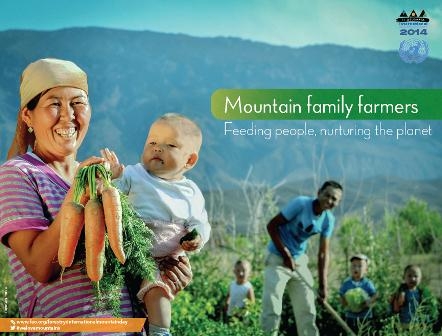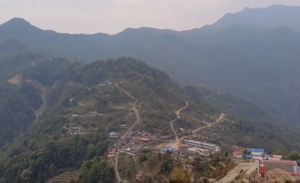IMD 2014 : Family Farming for Food Security and Prosperity in the Mountains

BY Tashi Dorji and Surendra Raj Joshi / ICIMOD
The UN General Assembly has designated 11 December International Mountain Day. International Mountain Day is an opportunity to create awareness about the importance of mountains to life and to highlight the opportunities and constraints in mountain development. The theme for this year’s International Mountain Day is ‘Mountain Farming’. The theme seeks to recognize and support the contribution of family and smallholder farms in reducing rural poverty and food security through small-scale, sustainable agricultural production. There are more than 570 million farms in the world of which over 500 million are family-owned and are responsible for at least 56% of agricultural production. Family farming is common in both developing and developed countries. In North and Central America, family farms make up 83% of the total farmland, while 85% of farmland in Asia and 68% in Europe is family-owned.
Family farming is a predominant farming system in the Hindu Kush Himalayas, where the majority of people are smallholder farmers engaged in subsistence agriculture. Family farming has deep economic and cultural significance in the mountain region. Apart from being a crucial means of organizing agricultural, forestry, fisheries, pastoral and livestock production, family farming is also an integral element of local tradition, as it is associated with family values and ownership that is passed down from generation to generation.
For centuries, family farmers have been diversifying and integrating multiple natural resource bases for their sustenance and livelihoods. Family farming is a major source of employment and the largest contributor of GDP in mountain areas. With their low carbon foot-print and their respect for the environment, family farmers play a key role in conservation and sustainable development. In addition, family farms help provide ecosystem services that are vital for development in areas beyond the mountains. These services include provision of freshwater, disaster risk reduction, preservation of biodiversity including agro-biodiversity, and space for recreation and tourism. Family farms in the HKH region are diverse in terms of their size, activities, availability of resources, and the degree of market integration. They operate in different economic, agro-ecological and social contexts.
Despite the rich biodiversity and ecological resources of the mountains, mountain family farmers are faced with numerous challenges. They have inadequate access to farm inputs, financial resources, technology, training, research and advisory services, and to basic infrastructure such as roads, transport, market and communication. Mountain farmers are often politically marginalized; their voices are often unheard by policy makers. Moreover, due to the alarming rate of out-migration among youth, family farming in mountain areas increasingly relies on women and elderly people. Almost 1,500 Nepali youths leave the country for foreign employment every day. Although the migrants send remittances (Nepal receives over $3 billion in remittances per year, which is equivalent to more than 20% of the GDP), it also means heavier workloads for those who stay behind, mostly women. Also, shrinking arable land and increasing fragmentation of farms make it difficult for mountain farmers to realize economies of scale. Their farm yield fluctuates a lot due to climate change and climate variability, and the price of farm inputs is volatile. Unlike large-scale farmers in the plains who are able to bargain and purchase more competitively, mountain farmers have weak bargaining power due to the low scale of their economy. Environmental degradation and human-wildlife conflict is another challenge mountain farmers face. Policies and programmes are often biased towards large farms and green revolution agriculture, with little attention to small family farms and mountain farming communities.
The International Year of Family Farming provides a unique opportunity to pave the way towards more inclusive and sustainable approaches for improving the livelihoods of small mountain farmers. The growing public awareness about food safety and hygiene has opened up new opportunities for small family farmers. They can produce high-value niche products (e.g., organic food, medicinal and aromatic plants) that can fetch better prices in the competitive markets. Their productivity and marketing capacity can be enhanced through value addition, farm aggregation and resources pooling to increase volume, reduce costs and increase efficiency. Contract farming arrangements would also help improve their capacity, bargaining power and cash income. Governments need to promote mountain-specific policies and strategies favourable to family farming. Similarly, there is a need to ensure family farmers’ access to services and agro-inputs, along with some incentives, to promote family farms. This would also help promote traditional crops that have high nutritional value and are more resilient to climate change.
ICIMOD’s regional programmes and initiatives promote successful models in value chain development for small family farmers in the mountains. These initiatives encourage private sector involvement and promote the principles of ecosystems-based conservation, access and benefit sharing and gender equity, while also trying to strengthen governance mechanisms. To build mountain farmers’ adaptive capacity, ICIMOD supports community-based micro planning from the perspective of the food-energy-water nexus and helps build upstream-downstream linkages. ICIMOD also documents and disseminates indigenous knowledge and practices that small farmers have honed over centuries. ICIMOD continues to support national organizations in developing policies that foster sustainable family farming.
Dr Tashi Dorji (tashi.dorji@icimod.org) is Livelihood Specialist, Conservation and Development and Dr Surendra Raj Joshi (surendra.joshi@icimod.org) is High Value Products Specialist at the International Centre for Integrated Mountain Development (ICIMOD).
Dec. 10, 2014














